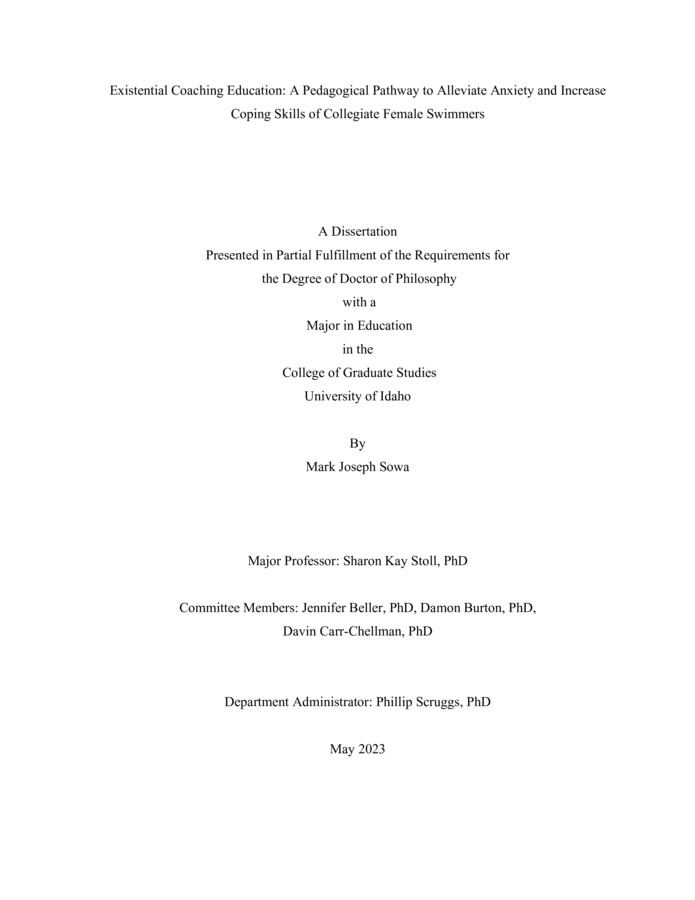Existential Coaching Education: A Pedagogical Pathway to Alleviate Anxiety and Increase Coping Skills of Collegiate Female Swimmers
Sowa, Mark Joseph. (2023-05). Existential Coaching Education: A Pedagogical Pathway to Alleviate Anxiety and Increase Coping Skills of Collegiate Female Swimmers. Theses and Dissertations Collection, University of Idaho Library Digital Collections. https://www.lib.uidaho.edu/digital/etd/items/sowa_idaho_0089e_12481.html
- Title:
- Existential Coaching Education: A Pedagogical Pathway to Alleviate Anxiety and Increase Coping Skills of Collegiate Female Swimmers
- Author:
- Sowa, Mark Joseph
- Date:
- 2023-05
- Keywords:
- anxiety coaching coping existential pedagogy phenomenology
- Program:
- Education
- Subject Category:
- Educational philosophy; Educational leadership
- Abstract:
-
Abstract Division I athletes are consistently exposed to daily stressors and how to cope with increased anxiety and depression. The win-at-all-costs nature of elite-level athletics produces an environment focused on performance rather than the person, increasing levels of stress and anxiety. The creation of a twelve-week systematic coaching intervention based on an existential philosophical framework focusing on the subjective lived experience of athletes was designed to assist female Division I swimmers with a phenomenological reduction aimed at alleviating trait anxiety and increasing athletic coping skills. The purpose of this quasi-experimental study was to examine the effect of a twelve-week systematic coaching education on the mental health and well-being of athletes as measured by levels of trait anxiety and athletic coping skills. The quasi-experimental design was a two-group pre/posttest design. Participants were NCAA female swimmers. Treatment group (n=23) and the control group (n=27) completed pre and posttests using the SAS-2 (trait anxiety) and ACSI-28 (coping skills). The treatment group received twelve reflection modules consisting of readings, discussions, and journaling. Research has argued that phenomenology can be utilized as a methodology to better understand the subjective experience of athletes (Allen-Collinson & Hockey, 2010; Allen-Collinson & Hockey, 2015; Breivik, 2013; Burton et. al, 2006; Cronin & Armour, 2015; Dale, 1996; Hockey & Collinson, 2007; Hughson & Inglis, 2002; James, 2017; Purser, 2018; Wacquant, 2004; Wharton, 2004). Utilizing phenomenology as the philosophical foundation, the construction of this intentional coaching pedagogy was based on Gill’s theoretical approach to learning (1993); Garrison’s reliance on passion, intuition, and vulnerability (1997); Lickona’s emphasis on role-modeling and storytelling (1991); and the ability to ask the correct questions to lead athletes to a be understanding of their personal experience in sport (Reimer et. al, 1983; Stoll, Beller, & Hahm, 2004). Most importantly, the intentional coaching pedagogy was constructed on a philosophical basis of Husserl’s phenomenological reduction (Husserl, 1962, 1975), Merleau-Ponty’s postulate of body-subject (1962, 1964) and Heidegger’s notion of authentic existence (1953, 1996). In all the treatment group wrote close to 188 pages of phenomenological reflections totaling close to 100,000 words of first-person reductions of their subjective lived experiences. A significant difference was found with the interaction of Time X Group on trait anxiety scores Wilk’s Lambda F (1, 48) = 8.39, p<.034, partial eta 2 = .09. Treatment group trait anxiety scores decreased from a pretest score of 35.0 + 1.7 to posttest score of 30.8 + 1.6, while control group trait anxiety scores remained the same from pretest 35.2 + 1.6 to posttest 34.6 + 1.5. No significant difference was found with the interaction of Time X Group on coping skills Wilk’s Lambda F (1, 48) = 5.76, p< .056, partial eta 2 = .074. Treatment group scores approached significance, increasing from a pretest score of 70.5 + 2.4 to a posttest score of 75.6 + 2.3. Control group scores remained the same from pretest 69.7 + 2.2 to posttest 70.2 + 2.5. An exploratory analysis showed that the curriculum had an impact on new incoming swimmers on coping skills (pre = 69. 3 + 3.3; post =77.1 + 3.2) and trait anxiety (pre=38.0 + 2.3; post=31.2 + 2.2). This pedagogical study shows promise that a twelve-week systematic coaching intervention can positively reduce anxiety and increase coping skills in female swimmers.
- Description:
- doctoral, Ph.D., Education -- University of Idaho - College of Graduate Studies, 2023-05
- Major Professor:
- Stoll, Sharon K
- Committee:
- Burton, Damon; Beller, Jennifer; Carr-Chellman, Davin; Scruggs, Philip
- Defense Date:
- 2023-05
- Identifier:
- Sowa_idaho_0089E_12481
- Type:
- Text
- Format Original:
- Format:
- application/pdf
- Rights:
- In Copyright - Educational Use Permitted. For more information, please contact University of Idaho Library Special Collections and Archives Department at libspec@uidaho.edu.
- Standardized Rights:
- http://rightsstatements.org/vocab/InC-EDU/1.0/

